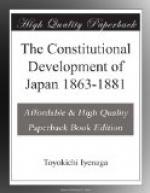If the passages quoted illustrate statesmen’s zeal to introduce western civilization, and to educate the people gradually to political freedom and privileges, their actions speak more eloquently than their words. In order to crush that social evil, the class system, which for ages had been a curse, the government declared all classes of men equal before the law, delivered the eta—the class of outcasts—from its position of contempt, abolished the marriage limitations existing between different classes of society, prohibited the wearing of swords, which was the peculiar privilege of the nobles and the Samurai; while to facilitate means of communication and to open the eyes of the people to the wonders of mechanical art, they incessantly applied themselves to the construction of railroads, docks, lighthouses, mining, iron, and copper factories, and to the establishment of telegraphic and postal systems. They also codified the laws, abolished the use of torture in obtaining testimony, revoked the edict against Christianity, sanctioned the publication of newspapers, established by the decree of 1875 the “Genro-in (a kind of Senate) to enact laws for the Empire, and the Daishin-in to consolidate the judicial authority of the courts,"[5] and called an assembly of the prefects, which, however, held but one session in Tokio.
While the current of thought among the official circles was thus flowing, there was also a stream, in the lower region of the social life, soon to swell into a mighty river. Social inequality, that barrier which prevents the flow of popular feeling, being already levelled, merchants, agriculturists, tradesmen, artisans and laborers were now set at liberty to assert their rights and to use their talents. They were no longer debarred from places of high honor.
The great colleges and schools, both public and private, which were hitherto established and carried on exclusively for the benefit of the nobles and the Samurai, were now open to all. And in this democracy of letters, where there is no rank or honor but that of talent and industry, a sentiment was fast growing that the son of a Daimio is not necessarily wiser than the son of a peasant.
Teachers of these institutions were not slow to infuse the spirit of independence and liberty into their pupils and to instruct the people in their natural and political rights. Mr. Fukuzawa, a schoolmaster, an author, and a lecturer, the man who exercised an immense influence in shaping the mind of young Japan, gave a deathblow to the old ideas of despotic government, and of the blind obedience of the people, when he declared that government exists for the people and not the people for the government, that the government officials are the servants of the people, and the people their employer. He also struck a heavy blow at the arrogance and extreme love of military glory of the Samurai class, with whom to die for the cause of his sovereign, whatever that cause might be, was the highest act of patriotism, by advocating that “Death is a democrat, and that the Samurai who died fighting for his country, and the servant who was slain while caught stealing from his master, were alike dead and useless.”




